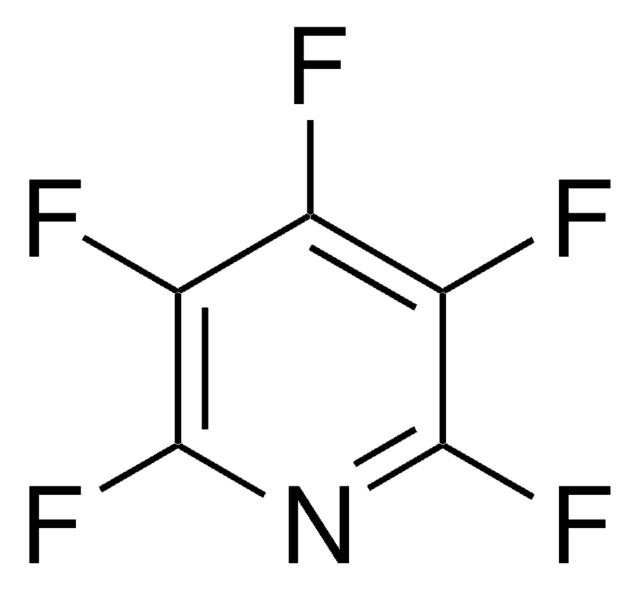All Photos(1)
About This Item
Linear Formula:
C6F5CN
CAS Number:
Molecular Weight:
193.07
Beilstein:
1913453
EC Number:
MDL number:
UNSPSC Code:
12352100
PubChem Substance ID:
NACRES:
NA.22
Recommended Products
Assay
99%
form
liquid
refractive index
n20/D 1.442 (lit.)
bp
162-164 °C (lit.)
density
1.532 g/mL at 25 °C (lit.)
SMILES string
Fc1c(F)c(F)c(C#N)c(F)c1F
InChI
1S/C7F5N/c8-3-2(1-13)4(9)6(11)7(12)5(3)10
InChI key
YXWJGZQOGXGSSC-UHFFFAOYSA-N
Looking for similar products? Visit Product Comparison Guide
Application
2,3,4,5,6-Pentafluorobenzonitrile was used in the synthesis of novel fluorinated poly(ether nitrile)s. It was also used in the synthesis of pentafluorophenyl analogs of noradrenaline, adrenaline and N-methyladrenaline.
Signal Word
Warning
Hazard Statements
Precautionary Statements
Hazard Classifications
Flam. Liq. 3
Storage Class Code
3 - Flammable liquids
WGK
WGK 3
Flash Point(F)
84.2 °F - closed cup
Flash Point(C)
29 °C - closed cup
Personal Protective Equipment
dust mask type N95 (US), Eyeshields, Gloves
Certificates of Analysis (COA)
Search for Certificates of Analysis (COA) by entering the products Lot/Batch Number. Lot and Batch Numbers can be found on a product’s label following the words ‘Lot’ or ‘Batch’.
Already Own This Product?
Find documentation for the products that you have recently purchased in the Document Library.
Customers Also Viewed
Synthesis of novel fluorine-containing poly (aryl ether nitrile) s derived from 2, 3, 4, 5, 6-pentafluorobenzonitrile.
Kimura K, et al.
Polymer Journal, 33(3), 290-296 (2001)
Highly fluorinated analogues of pharmacologically active compounds.
Chapman NB, et al.
J. Chem. Soc. Sect. C, 293-296 (1967)
Justin D Smith et al.
Nature communications, 10(1), 1837-1837 (2019-04-25)
Photocatalytic polymers offer an alternative to prevailing organometallics and nanomaterials, and they may benefit from polymer-mediated catalytic and material enhancements. MPC-1, a polymer photoredox catalyst reported herein, exhibits enhanced catalytic activity arising from charge transfer states (CTSs) between its two
Our team of scientists has experience in all areas of research including Life Science, Material Science, Chemical Synthesis, Chromatography, Analytical and many others.
Contact Technical Service









